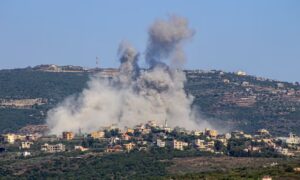
The National Interest Foundation Newsletter
Issue 247, August 2, 2024
Welcome to our NIF Newsletter. In this week’s latest edition, we analyze how Israel carried out two assassinations with the intention of dragging the U.S. into a regional war in the Middle East, examine the latest Israel-Lebanon tensions eliciting fear of potential wider-scale conflict, and look into some U.S. officials’ investing of public funds in Israeli bonds through deals that raise ethics concerns.
Editor: Bassam Tarbush
Israel Carried Out Two Assassinations with the Intention of Dragging the U.S. into a Regional War in the Middle East

The targeted assassinations are damaging escalations that only push the Middle East closer to region-wide conflict. (Photo from AP)
Israel Carried Out Two Assassinations with the Intention of Dragging the U.S. into a Regional War in the Middle East
Written By Camille Carter
On the heels of Israeli Prime Minister Benjamin Netanyahu’s highly-criticized address to Congress, news broke earlier this week of dual assassinations carried out by Israel against leaders from both Hamas and Hezbollah – Ismail Haniyeh, a political chief of the former who was killed in Iran, and Fuad Shukr, a senior official and commander of the latter killed in Lebanon. For many fair-minded analysts and commentators, these actions prove that Israeli officials have no real intention of initiating a ceasefire in Gaza and putting an end to hostilities there. On the contrary, the two assassinations represent bellicose behavior seeking to plunge the region into further conflict and all-out war. The actions are also consistent with longstanding contentions that Israeli officials have been deliberately sabotaging and derailing mediated efforts aimed at reaching a ceasefire agreement in Gaza, showing instead a desire to perpetuate hostilities in Gaza and the entire region at-large. Observers have pointed to the fact that Netanyahu is facing high levels of global condemnation and domestic discontent, not to mention impending criminal charges at home and abroad, and thus his government is cognizant that a cessation of hostilities would spell trouble for their political prospects. As a result, they have seemingly made the calculation that purposefully escalating the situation further is in their best interests. The two targeted assassinations risk spurring an all-out regional war and triggering expected retaliations, and U.S. President Joe Biden even recently acknowledged that the actions are not helpful to ceasefire talks and the quelling of tensions in the region.
Initiating a ceasefire in Gaza is the only way to halt hostilities in the Middle East, as all of the ongoing tensions on multiple fronts are tied to the damaging and longstanding conflict. The assassinations this week only serve to further stoke animosities and are harmful to the prospects for a deal. They did not come as a surprise to some experts, who have for months, been seeking to draw attention to Netanyahu’s blatant attempts to undermine the ceasefire negotiations since an end to the conflict would likely result in the collapse of his far-right coalition government and trigger an election. With regards to the manner in which the targeted assassinations were carried out, initially there were a variety of reports that came out detailing what was thought to be the cause of death of Ismail Haniyeh, however as time went on, a clearer picture was painted. Haniyeh was killed in the guest house that he had been staying at in Neshat, a neighborhood in Tehran. The cause of death was a bomb that had been stored there almost two months ago, remotely detonated once it was confirmed that Haniyeh was in the room. The security of the building is run by the Islamic Revolutionary Guards Corps, the same people who own the compound.
On the other hand, in Beirut, Fuad Shukr, a senior official and advisor of Hezbollah was killed. Shukr served crucially in the military wing of the organization, being specifically responsible for acquiring a variety of weapons such as specialized missiles, rockets, and UAVs. Among other things, Shukr was a close friend and strategic ally of the late Imad Mughniyeh, Hezbollah’s former military commander. The assassination of Mughniyeh back in 2008 led to Shukr’s rise in popularity and prominence within the group. Shukr was in the Haret Hreik district of Daniya, a suburb in southern Beirut on Wednesday morning when an airstrike took place on the building he was in. The Lebanese health ministry confirmed that there were three casualties, two of which were children, along with over 70 wounded, all being civilians. The blast also caused extensive damage to the suburban neighborhood, sending rubble and debris onto the streets below and around.
As the world continues to process these two assassinations, one thought has continually run through the minds of peace advocates and human rights activists: how do these killings do anything to help the prospects for a ceasefire deal and put an end to regional hostilities? The clear answer is that they do not, and conversely, the only role that they play is to further inflame tensions and increase the likelihood of wider-scale conflict in the Middle East. In the aftermath, the assassinations make the prospects for a ceasefire a much harder possibility than it already was, especially considering that Ismail Haniyeh himself had been a key figure that was engaged in the ceasefire negotiations being mediated by Qatar alongside Egypt and the United States. As pointed out by Qatar’s Prime Minister Sheikh Mohammed bin Abdulrahman bin Jassim Al Thani in response to Israel’s targeted assassination, “How can mediation succeed when one party assassinates the negotiator on the other side?” Hezbollah’s response to the assassination of Shukr emphasized the essential role that Israel’s actions in Gaza are playing in stoking regional tensions and hostilities, with the group stating that “There will be no solution except via stopping the aggression on Gaza.” Ultimately, the two targeted assassinations this week do not invoke a tone of peace, but rather, one of war and belligerence. This has prompted many impartial analysts to question whether Israeli officials possess any intent of initiating a ceasefire in Gaza, or whether the further stoking of tensions and hostilities is their only objective.
The assassinations of Ismail Haniyeh and Fuad Shukr have undeniably escalated tensions in the region, casting a dark light on the prospects of a much-needed and essential ceasefire deal in Gaza. With Hamas and Hezbollah both vowing retaliation and condemning Israel’s actions, the hope for a peaceful resolution seems to be becoming more and more of a distant thought. These killings have not only intensified hostilities, but have also raised significant doubts about Israel’s commitment to peace.
Israel-Lebanon Tensions Elicit Fear of Potential Wider-Scale Conflict

The latest tensions prompted frenzied diplomatic efforts to try and prevent any further escalations. (Photo from Getty Images)
Israel-Lebanon Tensions Elicit Fear of Potential Wider-Scale Conflict
Written By Sheyanne Barr
For the second time this summer, the tension between Israel and Hezbollah along the Israel-Lebanon border has drawn international admonishment. In recent weeks, the situation has deteriorated, driven by heightened confrontations between Hezbollah and Israeli forces. The exchanges of fire have intensified, leading to a series of retaliatory strikes that have exacerbated fears of a larger-scale confrontation in the region. Over the preceding days, several destructive strikes have come from both sides, with understandable speculation and calls for an outside investigation into the Golan Heights strike this past weekend. The low-level conflict that has been simmering since last October escalated after a missile attack in the Golan Heights area of northern Israel which killed 12 children. This strike, if conducted by Hezbollah, differed significantly from past attacks that have usually focused on Israeli military targets. The attack and the subsequent strike from Israel that killed a Hezbollah commander, compounded with the assassination of a senior Hamas political leader in Iran, has brought Israel, Lebanon, and Iran all closer to all-out war.
Since the July 27th attack on Golan Heights, Israel has launched attacks of its own over the northern border, at least one of which killed several children. The hypocrisy of the Israeli narrative has not gone unnoticed, especially considering the estimated nearly 15,000 children that have been killed by Israeli attacks during the Gaza War. The recent escalation, and inevitable retaliation by Hezbollah and Iran, have prompted more outcries for Israel to put an end to its hostilities in Gaza. Despite the continued efforts of U.S. Envoy Amos Hochstein and others, the conflict has continued, and the inability to initiate a ceasefire deal in Gaza has propelled further motivation for Hezbollah attacks.
The efforts to reach a ceasefire agreement in Gaza have continued to face numerous hurdles. Negotiations have been perpetually impeded by conflicting demands and late-stage rewrites that have taken place – leading many to understandably ascertain that Israeli officials are purposefully sabotaging any attempts at implementing a deal. Despite these obstacles, international mediators are pushing for renewed talks and at least a temporary truce in order to alleviate the dire humanitarian crisis in Gaza, and ultimately pave the way for more substantive negotiations. The success of these efforts is seen as critical, not only for the immediate relief of humanitarian suffering, but also for stabilizing the broader regional situation. The nature of the U.S.-Israel relationship demands that the United States both be involved in and apply pressure to Israel if a ceasefire is to be reached before circumstances devolve further. These attempts are of the utmost importance, as the potential for a wider-scale conflict could have devastating consequences, not only for Lebanon and Israel, but for the entire Middle East.
The situation along the Israel-Lebanon border is a reminder of the complex and interlinked nature of conflict in the region. The Israeli-Lebanese front has historically been a flashpoint, and the recent escalation highlights how quickly local hostilities can draw in wider regional dynamics. Hezbollah’s involvement and the broader geopolitical implications of its actions contribute to the heightened tensions. The group’s military capabilities and political influence, both in Lebanon and Iran, have added layers of complexity to the conflict and made diplomatic efforts all the more challenging. This is especially poignant after the Israeli strike that took place during the new Iranian president’s inauguration.
The violence in Gaza has already caused massive levels of humanitarian suffering and instability. The ongoing hostilities between Israel and Hamas have drawn global attention, and the call for a cessation of hostilities has grown increasingly urgent. In the meantime, the civilian death toll will continue to rise and fuel the fire of an already war-weary region of the world. The tensions with Hezbollah only add to the complexity of the situation, making a resolution in Gaza even more essential. Should Israel fail to find a peaceful resolution, it could very well find itself in a war with Iran, something that would only add to a strained U.S. arms pipeline. A comprehensive ceasefire in Gaza would alleviate tensions in the region, and help create a more stable environment that might reduce the risk of further escalation in Lebanon and elsewhere.
The recent strikes underscore a seemingly increased disregard that Israel has for the established norms of global politics and human rights. The fear of a wider-scale conflict looms large as tensions escalate between Israel, Hezbollah, and Iran. The ongoing crisis in Gaza further complicates the situation, making a cessation of hostilities there vital. As international actors work to manage and mitigate these crises, the interconnected nature of the conflicts reveals the urgent need for coordinated diplomatic efforts to achieve lasting peace and stability while preventing even more humanitarian suffering.
Some U.S. Officials’ Investing of Public Funds in Israeli Bonds Through Deals Raise Ethics Concerns

Thousands of pages of emails and other records illustrated Israel Bonds’ immense efforts to court public officials in the United States. (Photo from AP)
Some U.S. Officials’ Investing of Public Funds in Israeli Bonds Through Deals Raise Ethics Concerns
Written By Cameron Reynolds
Since its establishment in 1951, Israel Bonds has sold bonds to finance government and military assets. The organization is also commonly known as the Development Corporation for Israel, originally having been set up to utilize funds and resources from the Jewish Diaspora within the United States to foster the development of Israel. Historically, the bonds have been portrayed as gifts used for celebrations, yet Israel Bonds has altered its marketing practices, evolving into a vital source of government funding. A recent July 2024 investigation undertaken by the International Consortium of Investigative Journalists (ICIJ) obtained more than 2,000 pages of emails and records which highlight the organization’s wide-ranging and questionable efforts to influence U.S. elected officials. This included U.S. public officials being rewarded with private meetings with top Israeli counterparts, as well as lavish events and celebrations. Most concerningly, the documents reveal Israel Bonds’ extensive attempts to secure U.S. taxpayer money in the form of public investments, which also involved the promoting of pro-Israel messaging and a blurring of the line between public and private business activities. According to experts, the methods that were used to obtain bond purchases – as evidenced in the investigative records – “go well beyond what’s seen as acceptable” behavior.
Israel Bonds has engaged in efforts to support banks and various institutional investors, such as U.S. states and municipalities. Recently in August of 2023, an Israel Bonds executive emailed the Ohio state treasurer’s office. The executive attempted to sell $5 million worth of Israeli bonds, which was agreed to by the treasurer’s office, resulting in the state’s purchase total reaching $35 million for the calendar year. Simultaneously, millions of dollars in state funds were appropriated to the bonds purchase by Ohio Republican Treasurer Robert Sprague. Treasurer Sprague also coordinated with the bond seller’s business team to participate in a guided trip of Israel in late 2023. Just six weeks following the treasurer’s bond purchase, the October 7th Hamas attacks took place, prompting U.S. President Biden and Congress to provide significant funding and military aid to Israel. State and municipal governments also demonstrated their support by investing in Israeli-issued sovereign bonds. Since the events of early October 2023, about $1.7 billion worth of Israeli bonds have been purchased by U.S. states and municipalities, with various officials on both sides of the aisle proudly displaying their investments. However, during the early stages of the Gaza War, the Financial Times reported that Israel discretely borrowed billions of dollars through the issuing of bonds in private dealings. The stability and reliability of the bonds has been in question as credit agencies downgraded them amidst the conflict, yet it appears as though many U.S. state and local entities were not dismayed by the downgrades.
Furthermore, just a few days following the October 7th attacks, Treasurer Sprague announced that Ohio would be investing an additional $20 million in Israeli bonds. The Ohio treasurer had a trip planned to Israel in 2023 prior to the Hamas attacks, with elements of his itinerary resembling a luxury vacation. This included staying at a five-star Jerusalem hotel, a gala dinner at a subterranean venue, and a trip to the City of David where he was scheduled to receive an “exclusive tour of places not yet open to the public.” Sprague was also expected to meet with top Israeli politicians, with his office claiming that the trip was going to be paid for by personal funds. Observers have pointed out that Ohio’s ethics law forbids public officials from taking substantial gifts from an “improper source,” such as any person or organization “seeking to do business with the agency.” Things of substantial value consist of lavish meals, entertainment activities, and travel to exotic locations, but despite this, Sprague’s 2023 financial disclosure form lists nothing related to Israel Bonds. Additionally, in the state of Florida, the Democratic Chief Financial Officer of Palm Beach County Joseph Abruzzo presented a plan to invest $160 million in Israeli bonds merely during the month of October, and this past March, the Palm Beach County Board of Commissioners approved a further request by Abruzzo to raise the cap on investments from 10% to 15%. This prompted a group of Americans of Palestinian descent to sue Abruzzo for allegedly investing based on his political and ideological interests.
Typically, government officials are deterred from any actions that may reflect a conflict of interest resulting in the favoring of particular assets, even if they are not the best available investment option. University of Minnesota law professor and former chief White House ethics lawyer in the George W. Bush administration, Richard W. Painter, stated that “These types of practices, the mixing up of the personal and official, seem to go well beyond what’s seen as acceptable.” The organization Democracy for the Arab World Now (DAWN) submitted a complaint with the U.S. Department of Justice expressing that Israel Bonds was in violation of federal law implemented to monitor foreign influence in U.S. government entities. The fact that a clear correlation can be made between U.S. states who invest in Israeli bonds and those who advocate against investment decisions based on social factors demonstrates how the behavior influences actions and stances. The recent ICIJ discoveries also highlight the glaring clouding of the boundary between private affairs and official public business. Thus, in the aftermath of the ICIJ investigation, Israel Bonds has been engulfed in political controversy. The organization is facing backlash from activists wary of the Israeli government’s actions since October 7th. The overwhelming evidence of egregious war crimes and human rights violations committed by Israel has compounded the Israel Bonds controversy. During the course of the preceding months, many have called for the divestment from financial entities that support Israel’s destructive efforts in the Gaza War. Oppositionists to the Israeli bond investments justifiably argue that taxpayer dollars should not contribute to foreign war efforts – especially one that has been heavily criticized for its array of human rights violations. The lack of transparency between the dealmakers and the public, coupled with Israel’s actions in the Gaza War, raise serious concerns over the unethical conduct and use of taxpayers’ dollars.
